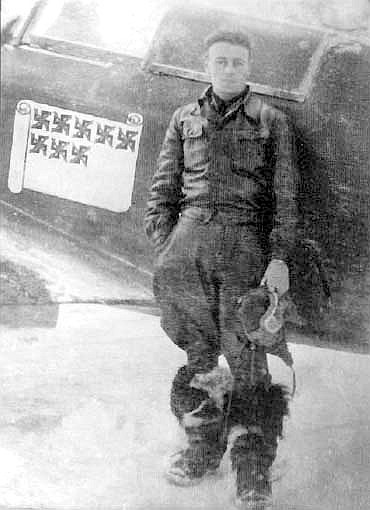Viktor Khasin was born in 1915 in Vinnitsa, in Ukraine. His father was a clerk. Upon graduating from a general 7-year school, he studied at a workers' school and joined the local flying club. Later he worked as an instructor there. Khasin was drafted into the Red Army in 1939 and was sent to the Odessa School for Military Pilots.
Khasin was at the front from the very first days of the Soviet-German war. Although he was a fighter pilot, more than once Khasin took part in ground operations as an attack pilot. In addition to destroyed enemy aircraft, his military record includes the destruction of some enemy tanks and various kinds of equipment. He fought in Ukraine in the summer of 1941 and, in the fall of that year, took part in the defense of Moscow. There he was promoted to the rank of senior lieutenant. In the summer of 1942 Khasin took part in the defense of Stalingrad. By August 1942, he made flown than 400 sorties. In November 1942, during the Soviet counter-offensive from Stalingrad, on a reconnaissance mission, Khasin discovered an enemy airfield with more than hundred camouflaged planes. On the same day, he, as a fighter pilot, took part in the destruction of the airfield. After that, he was awarded the Order of Lenin and promoted to the rank of captain.
At the end of 1942, Khasin was transferred to the Northwestern Front. There, in February 1943, he narrowly escaped death. Khasin took part in a battle with several German airplanes, including a newly deployed Dornier 217. Khasin succeeded in shooting down the Do-217, he was wounded and suffered burns when his plane was hit by an enemy shell. Khasin escaped by parachute when he was only 150 meters (500 feet) in the air. Since a parachute cannot open at this height, the only thing that saved Khasin's life was the deep snow into which he fell.
On May 1, 1943 Captain Viktor Khasin was awarded the title of Hero of the Soviet Union.
In January 1944, during an air battle near Vitebsk, Khasin's plane was shot down, and he was seriously wounded. This time the pilot succeeded in using his parachute. Only after three days of suffering from burns and other wounds, was he able to reach Soviet lines. Then, he was found by a Red Army medical unit and brought by plane to a hospital in Moscow. He died in the hospital on January 14. To his dying day, Major Viktor Khasin did not know that his mother had been shot quite some time ago by the occupiers of Vinnitsa and that his sister had perished in a German concentration camp.







